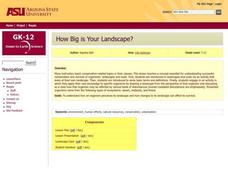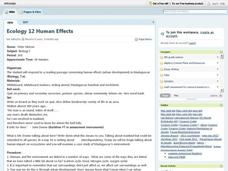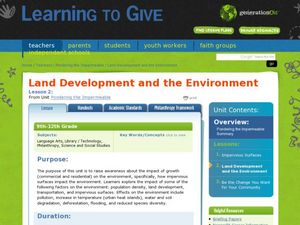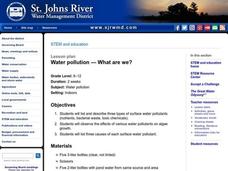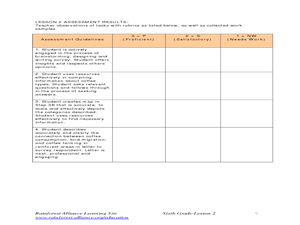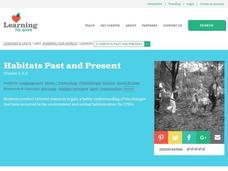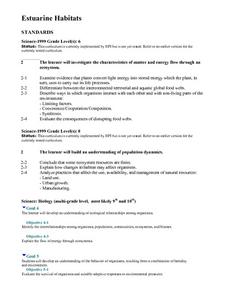Curated OER
Green Space in the City
High schoolers identify the different kinds and uses of green space that exist in an urban area. They create maps of local parks and research the history of each park. They conduct a survey of residents near the park and interview a park...
Curated OER
How Big Is Your Landscape?
Students explore how an organism perceives its landscape and how changes to its landscape can effect its survival. Of particular focus is the effect of urbanization and the organisms survival in the cities.
Curated OER
The Immigrant Experience In America
Students study immigration, Ellis Island, and tenement life from 1890 to 1924. Each student create an identity of an immigrant and write an essay in the first person. Essays describe what they found when they arrived in New York City.
Curated OER
Ecology 12 Human Effects
Learners are able to respond to a reading passage concerning human effects (under development) in Madagascar. They have a quiz on primary and secondary succesion as their bell ringer. Students write an essay on the topic "No man is an...
Curated OER
What is a National Forest
Students select and research a National Forest near their local community. They read and discuss the pamphlet "A Guide To Your National Forests," view photos of national forests, conduct Internet research, and complete the student...
Curated OER
Land Development and the Environment
Young scholars examine the relationship between land development and the environment. For this environmental stewardship lesson, students explore how population density, land development, transportation, and impervious surfaces take...
Curated OER
What Are We?
Students list and describe three types of surface water pollutants. They observe the effects of various water pollutants on algae growth. Three causes of each surface water pollutant is listed.
Curated OER
Get to Know- Insects, Spiders and Others
Students investigate live insects. In this insects and spiders lesson, students work in groups to explore the outdoors and capture insects. Students observe, discuss and record information about the insects they discover. Students...
Curated OER
Canada's Arctic Barometer
Middle schoolers research arctic climates. In this Web-quest investigation, students will identify Arctic climate changes, explain the effects of these changes, relate the changes to other regions, and write their findings in a letter...
Curated OER
Know Your Watershed
Students investigate the importance and the location of their own watershed by visiting and EPA website and also work in groups to create an action plan on how to protect their local watershed.
Curated OER
Cougar or Human: Which Needs Protection?
Students research the biology and natural history of the cougar. Students conduct Internet research to determine how cougars have been protected by humans and how it is affected by human decisions. Students write about reconciling...
Curated OER
What If We Run Out?
Students explore the consequences of shrinking habitats and the human impact on wildlife populations. They participate in a game to study the consequences and describe the preservation of animal habitats.
Curated OER
Whose Breakfast isn't for the Birds?
Students explore coffee production. In this cross-curriculum rainforest ecology lesson, students research regions where coffee comes from and investigate how the native birds in the rainforest are effected by coffee production. ...
Curated OER
N, B, and T: Pollutants Three
Students explore nutrient, bacterial, and toxic surface water pollution. They identify the amount of water they use each day and summarize the kinds of substances that cause water pollution. They predict what will happen in water...
Curated OER
Habitats Past and Present
Students explore the changes in animal habitats. In this ecosystem lesson, students use the Internet to explore the changes in the environment since the 1700's. Students complete a Venn diagram to compare the differences in the animal...
Curated OER
Green Space in the City
Students examine city parks and their importance and affect they have on the health and well being of a community. An oral report with visual aids is prepared as a group to educate the class on the importance of green space in the city.
Curated OER
Estuarine Habitats
Sixth graders study the important habitats, flora, fauna, and physical factors of coastal habitats. They compare the aquatic habitats to terrestrial habitats by researching and completing tables with the information.
Curated OER
Diseases Are Real
Eleventh graders research industries that contribute to sanitation and pollution problems. They investigate the direct result of unhygienic practices including disease outbreaks or specific illnesses. They create a Power Point...
Curated OER
I Need More Information!
Students decide on an issue and then determine what questions they would like to have answered while researching the topic. They develop and improve their research skills by using a variety of available sources to investigate and write...
Curated OER
Pumped Up Gas Prices
Students investigate the concepts of differing gas prices and how they are set in different geographical areas. They conduct research about the economic concepts of supply and demand and predict the outcomes upon the prices of gasoline.
Curated OER
African Americans: 1800 - 1870
Students explore living and working environment of both slave and free African Americans from places throughout the United States.



